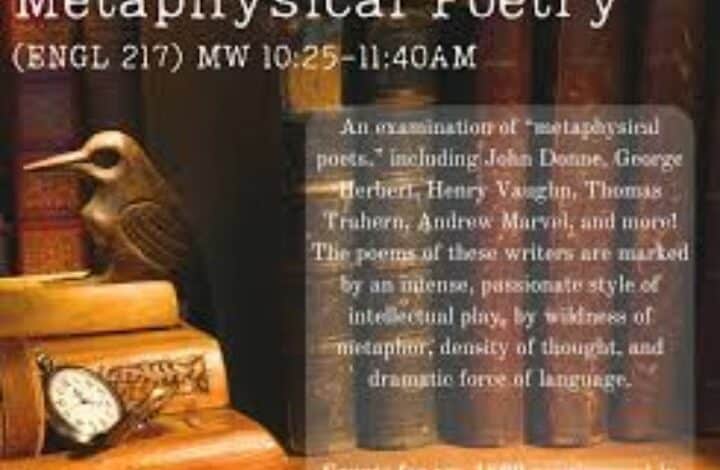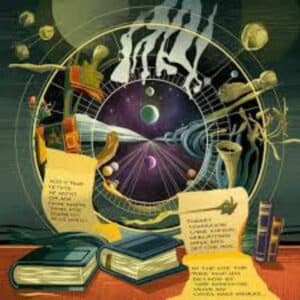
Metaphysical poetry is a genre that has captivated literary scholars and enthusiasts alike for centuries. With its distinctive blend of intellectual rigor, emotional depth, and intricate use of metaphor, metrical ingenuity, and philosophical musings, it stands as a unique pillar of English literature.
If you’ve ever wondered what makes metaphysical poetry so compelling or sought to understand its nuances better, you’re in the right place. This article will take you through the history, key features, and some of the most renowned poets who contributed to this literary tradition.
What is Metaphysical Poetry?
Metaphysical poetry refers to a group of 17th-century poets in England whose works explore complex and abstract ideas, often related to life, love, religion, and philosophy. The term metaphysical was coined by Samuel Johnson in the 18th century to describe the witty and intellectual style of these poets, who often used extended metaphors, or “conceits,” to explain abstract concepts.
What makes metaphysical poetry stand apart is its intellectual and often paradoxical nature. Unlike the smooth, romanticized verses of their contemporaries, metaphysical poets incorporated a sharp, almost argumentative style, blending philosophy, science, and spirituality into their works.
The Birth of Metaphysical Poetry
The birth of metaphysical poetry can be traced back to the late 16th and early 17th centuries in England. This period was marked by significant intellectual, religious, and political upheaval, which provided fertile ground for metaphysical poets to engage with existential and philosophical questions.
While the movement didn’t have an official leader or founder, poets like John Donne, George Herbert, Andrew Marvell, and Henry Vaughan are often considered the core figures in this literary movement.
John Donne is arguably the most famous of the metaphysical poets. His works are characterized by their intellectual vigor, complex metaphors, and daring explorations of love, death, and the afterlife.
In poems like The Flea and A Valediction: Forbidding Mourning, Donne used elaborate conceits to express abstract ideas about love and separation, blending personal emotion with universal themes.
Key Characteristics of Metaphysical Poetry
There are several defining features that help identify metaphysical poetry:
- Intellectual Complexity
Metaphysical poetry frequently deals with intricate philosophical concepts. Whether discussing the nature of the soul, the reality of love, or the meaning of life, metaphysical poets are never afraid to tackle complex intellectual terrain. Their works often require close reading and deep contemplation to fully appreciate their meaning. - Conceits (Extended Metaphors)
One of the defining characteristics of metaphysical poetry is the use of conceits, which are elaborate and often surprising metaphors that stretch the imagination. For example, in The Flea, Donne compares the relationship between two lovers to the mingling of blood in a flea’s bite. These conceits are not just ornamental; they serve to deepen the intellectual engagement of the poem. - Wit and Paradox
Metaphysical poets often used wit sharp, clever wordplay and unexpected juxtapositions to make their points. This intellectual playfulness is frequently tied to paradoxes, where seemingly contradictory ideas are reconciled to reveal deeper truths. This creates a sense of tension in the poem, as readers are asked to reconcile opposing ideas. - Philosophical and Spiritual Themes
Love, death, and religion are frequent themes in metaphysical poetry. Metaphysical poets often engage in philosophical musings on the nature of existence and the divine. They explore questions about the soul, the afterlife, and the relationship between the human and the spiritual world. - Personal Voice
While metaphysical poetry is deeply intellectual, it also often contains a personal, confessional voice. The poets would express their own feelings, doubts, and beliefs, providing a deeply intimate view of their minds and emotions. This blend of personal reflection with broader philosophical themes creates a dynamic tension in the poetry.
Metaphysical Poetry
Famous Metaphysical Poets
While many poets contributed to the development of metaphysical poetry, a few stand out for their lasting impact.
John Donne
John Donne is perhaps the quintessential metaphysical poet. His poetry is known for its emotional intensity, intellectual engagement, and complex metaphors. Donne’s work addresses themes of love, faith, mortality, and the afterlife.
His use of paradoxes and wit makes his poems intellectually stimulating and emotionally resonant. Notable works like The Sun Rising and Holy Sonnet 10 illustrate his genius in blending intellectual exploration with profound emotional depth.
George Herbert
George Herbert, a contemporary of Donne, is another key figure in metaphysical poetry. Herbert’s works are more religious in nature, often exploring themes of devotion, faith, and spiritual struggle.
His The Temple, a collection of religious poems, demonstrates his mastery of metaphysical conceits and philosophical inquiry. Herbert’s poetry is characterized by its simplicity, sincerity, and direct engagement with the divine.
Andrew Marvell
Andrew Marvell, often considered one of the greatest metaphysical poets, blends elements of nature, philosophy, and love in his poetry. Marvell’s most famous poem, To His Coy Mistress, uses elaborate conceits and metaphysical reasoning to address the themes of love and time.
The poem’s opening lines suggest an idealized, almost infinite form of love, but the conclusion acknowledges the fleeting nature of human life and the need to seize the moment.
Henry Vaughan
Henry Vaughan’s poetry is deeply spiritual, with an emphasis on the relationship between the earthly and the divine. Vaughan’s works often reflect his fascination with mysticism and the nature of the soul. His collection Silex Scintillans features poems that explore the soul’s journey toward God, blending metaphysical ideas with vivid imagery.
Also Read: Ancient Love Poetry
The Influence of Metaphysical Poetry on Later Writers
While metaphysical poetry might have declined in popularity during the late 17th century, its influence persisted in the work of later writers. The intellectual rigor and emotional depth of metaphysical poetry left an indelible mark on the development of English literature.
In the 20th century, poets such as T.S. Eliot and W.B. Yeats drew on metaphysical themes and techniques. Eliot, in particular, was influenced by the metaphysical poets’ ability to blend intellectual complexity with emotional intensity.
Final Thoughts Of Metaphysical Poetry
Metaphysical poetry offers readers a chance to engage with some of the most profound and complex ideas in literature. Whether you’re interested in exploring the nature of love, contemplating the afterlife, or engaging with philosophical concepts, the metaphysical poets provide an intellectually stimulating experience. Their poems encourage critical thinking and introspection, offering both aesthetic pleasure and intellectual depth.
In conclusion, metaphysical poetry remains a powerful and evocative literary movement, one that challenges its readers to think deeply and engage with life’s big questions.




